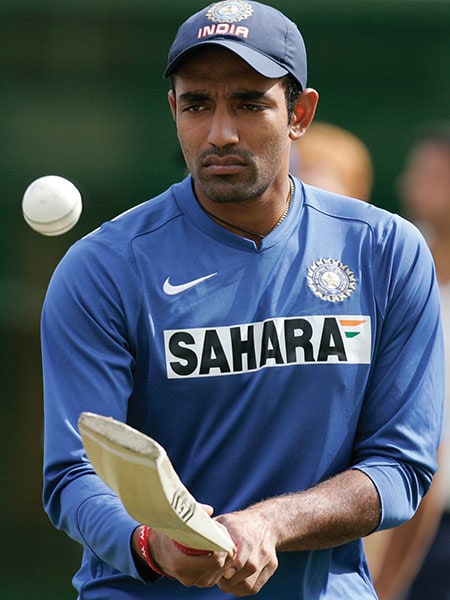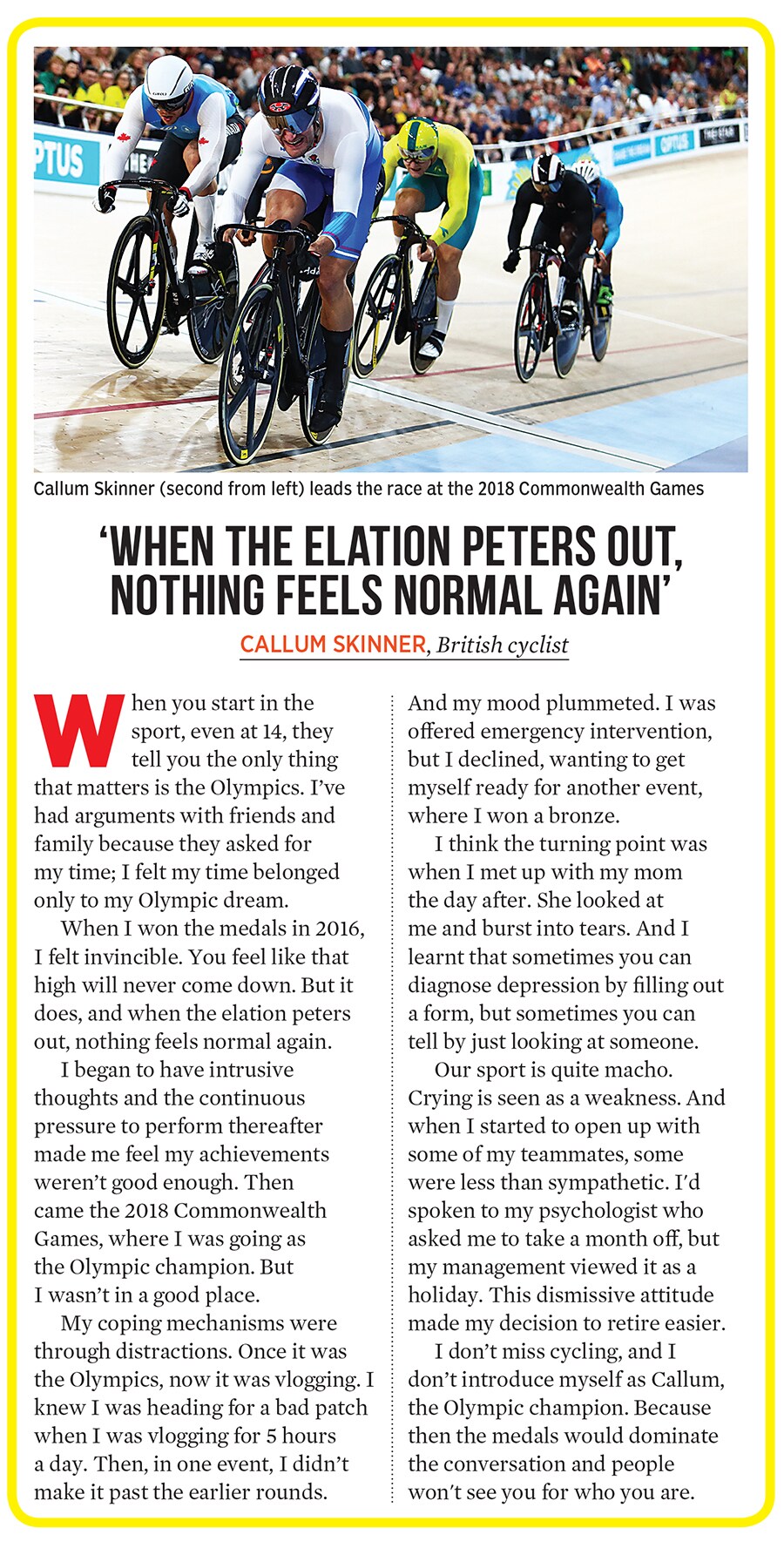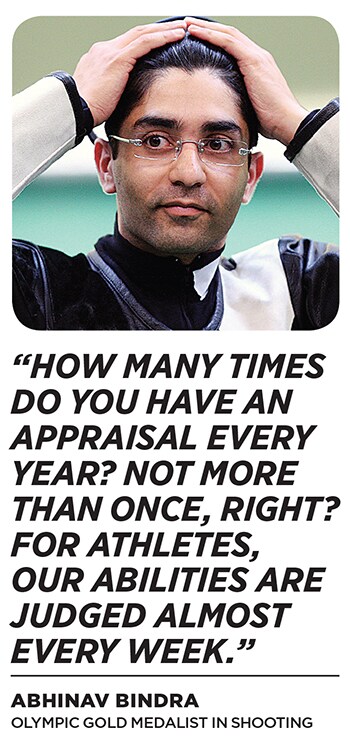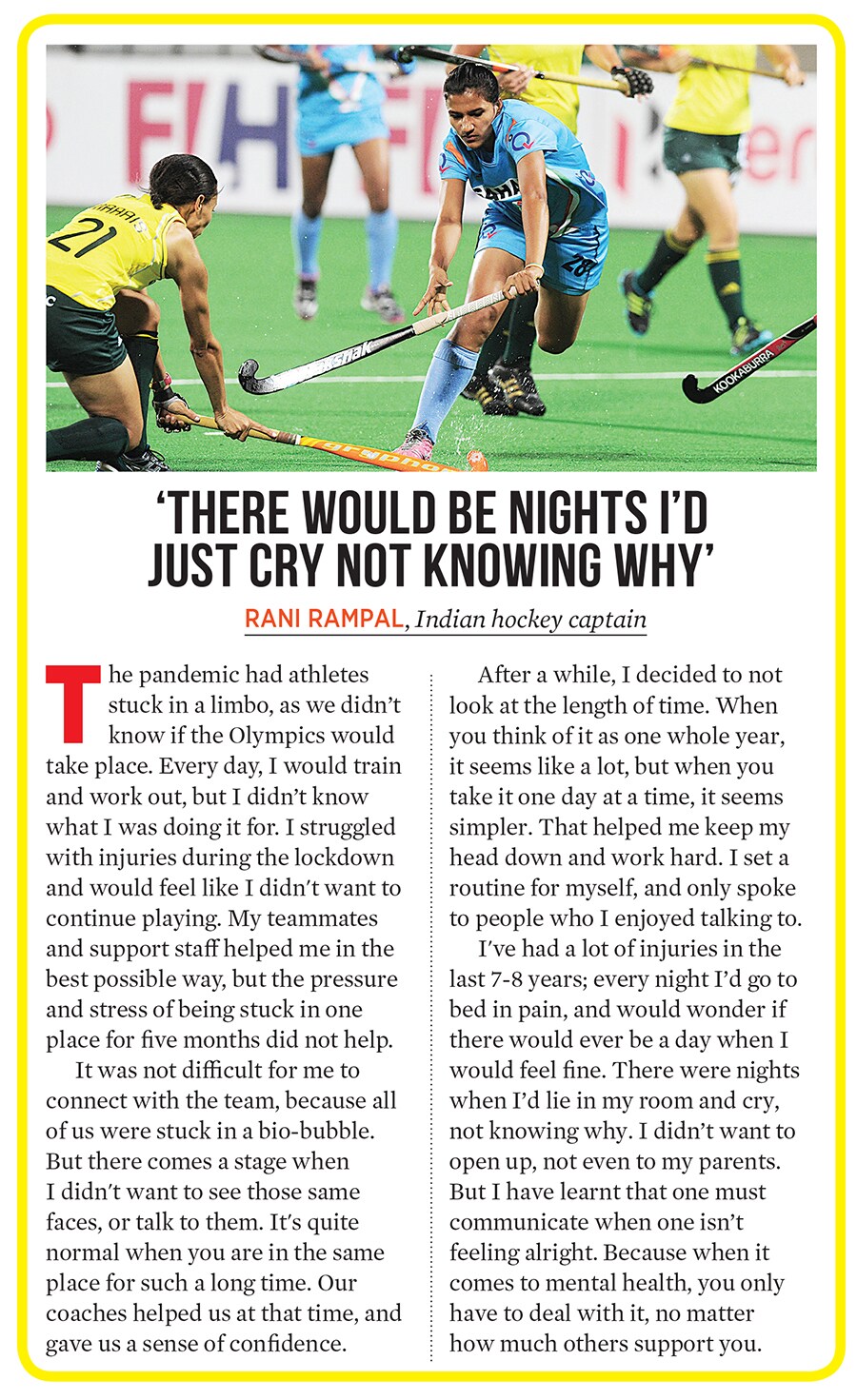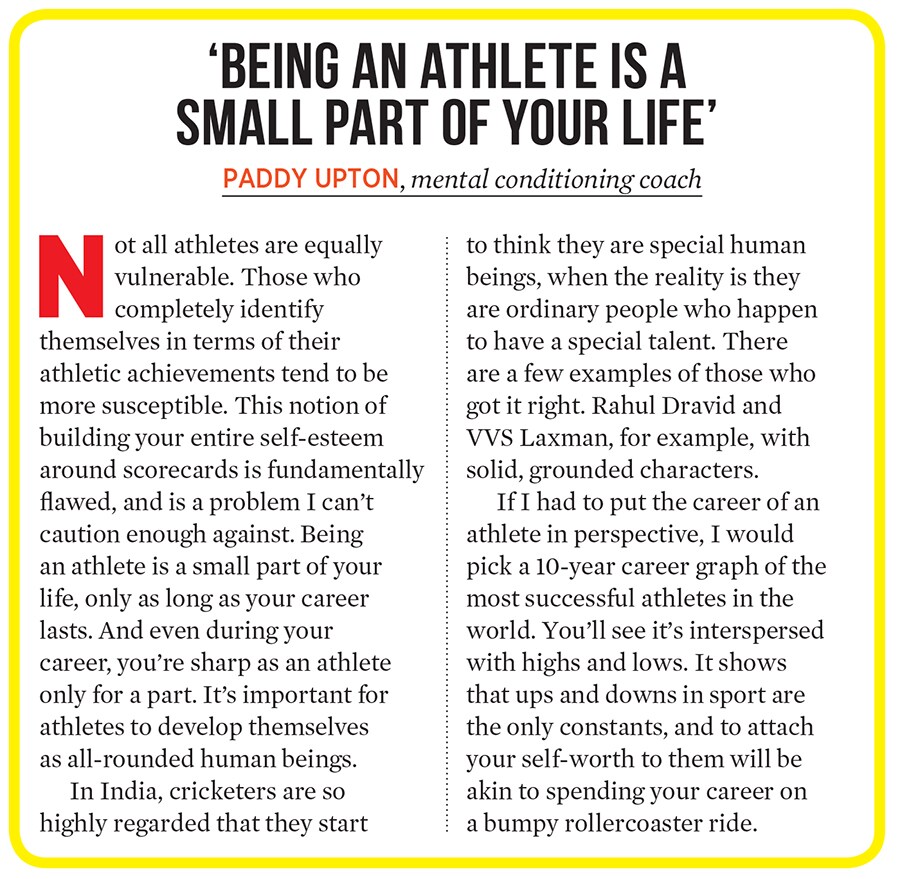It took Uthappa five years to heal—through victories in the Ranji and the Vijay Hazare trophies, and winning the Orange Cap as the highest run-getter in the IPL, but also days of freefall. In 2018, he began to share his journey “because I felt like I was overcoming all that I’ve been through".
The 35-year-old is among the earliest of Indian elite athletes to open up on a subject that’s considered a taboo in society, especially among sportspersons. In public perception, athletes are equated with endless resilience, and ideas of mental strength and mental health are conflated. Even some years ago, every discussion on mental health would swing between the flippant and terse, and conclude with, as Uthappa says, either “manage kar lo [manage it]" or “khel par dhyaan do [focus on the game]".
But repeated assertions from decorated international athletes—from American swimmer Michael Phelps and tennis legend Serena Williams to former NBA star Jerry West and Australian cricketer Glenn Maxwell—have kept the subject alive and chipped away at notions that likened depression or anxiety to merely defeat. Phelps’ bouts came along even as he picked up Olympic golds at will, while Williams conceded in 2011 that she was “miserable" following her Wimbledon victory the previous year. And recent confessions from Virat Kohli and Sachin Tendulkar about loneliness through bad patches, despite their stature as cricketing divinity, have begun to normalise conversations around mental health.
In 2018, the International Olympic Committee (IOC) convened a consensus meeting at which a panel of 23 experts from 13 nations reviewed 14,689 published articles on mental health in elite athletes and furnished a consensus statement to “inform clinical practice, and guide individual and systemic interventions". It confirmed that 33.6 percent of elite athletes reported symptoms of depression or anxiety. A 2020 study quoted in the statement also found that one in six international athletes from the field of athletics reported experiencing suicidal thoughts.
But it is rising tennis star Naomi Osaka who broke open the Pandora’s Box with a sledgehammer this May, when she refused to meet the press during the French Open, citing depression and social anxiety. When the Grand Slam authorities threatened to expel her, she pulled out, triggering a tsunami of support. “If Roger Federer can [due to physical strain], why can’t Osaka?" asked tennis fans. “In a way, we should be grateful to Naomi for throwing light on the issue," says Uthappa. “Hopefully, people in power will now begin to create avenues for athletes."
Gunning For Gold
While society as a collective is slowly waking up to mental health as a ‘silent pandemic’ within the Covid pandemic, athletes, as a group, have always been more vulnerable to it. Perhaps more than the 9-to-5 professionals. Consider the intense public scrutiny they have to live with through their careers. “How many times do you have to face an appraisal at your office every year?" asks Abhinav Bindra, India’s only individual Olympic gold medallist, a member of the IOC Athletes Commission, and part of a team that developed the IOC Mental Health In Elite Athletes Toolkit 2021. “Not more than once, right? For athletes, multiply that by the number of tournaments they play in a year. Our abilities are being judged as frequently as every week."
The weight of the public gaze was once captured by Caroline Kennedy, daughter of former US president John F Kennedy, who had given up her aspirations of becoming a photojournalist. Kennedy had realised “she could never make her living observing other people because they were too busy watching her".
It is especially true in a country like India, where most accomplished athletes, especially cricketers, are revered. Which is why every time Kohli returns to the pavilion without a big score, he trends on Twitter for the wrong reasons. Or every innings that Jasprit Bumrah goes wicketless, like during the recent World Test Championship final against New Zealand this June, he turns into a meme.
“We aren’t perfect in our own lives, but we build up unreasonable expectations for our athletes. When they don’t meet those, we pull them down," says Dr Chaitanya Sridhar, a leading holistic sports psychologist who travelled with IPL franchise Royal Challengers Bangalore (RCB) during the 2020 season. She recalls that during her research on ‘emotional management in cricket’ from the University of Western Australia, she came across an Indian cricketer who spoke about maintaining a stoic “player face" in public. “Over time, he got so used to that persona that he couldn’t even emote at home when his partner or mother were, say, crying. It made me wonder whether we, as a society, are supporting our athletes."
![]()
In a society that’s driven by ambition and high performance, a sportsperson is often forced to derive identity and self-esteem from scorecards. And those who are less-than-perfect are quickly cast aside. “Samjhana sabko aata hai, par samajhna bahut kam logo ko [everyone knows how to explain, but few understand it themselves]," says Rani Rampal, the skipper of the Indian women’s hockey team headed for the Olympics. “Everyone wants a medal. When the pressure of expectations comes through, it makes you overthink."
It’s worse when you are the captain. “You have to put up a brave face even when you aren’t feeling well. I’ve had to learn to tell myself that I am a human being first, and a leader and an athlete later," adds the 26-year-old.
But if you are a part of the system, there’s no escaping the single-minded winner-takes-all focus. Callum Skinner, a now-retired British cyclist and a double Olympic medallist in 2016, feels depression had been a constant companion for him, but was covered up in an “all-encompassing distraction"—the Olympics. “Winning there was a life-and-death matter," says Skinner, now the head of Global Athlete, an international campaign that is pushing for better rights and conditions for athletes. “One of my best friends asked me to be the best man at his wedding and I turned it down. The closer you get to the goal, you exclude everything else in life."
![]()
When Skinner won the Olympic medals, he felt invincible. “My parents said they haven’t seen me this elated before," he says. But when the high wore off, the 28-year-old Scot went into a depressive spiral and was diagnosed with manic depression. “It’s not that I was worse off than before, but the Olympic high was so high that everything else compared to it felt like a downer. I couldn’t take normal life."
Bindra, too, has fought depression, once his lifelong obsession—an Olympic gold—was in his pocket. In his autobiography, A Shot At History, he writes, “Now I could sleep late, but I didn’t know how to. I was dressed, but with nowhere to go. In my range I found myself lost, my gun I didn’t want to touch. I had gone from 100 percent obsession to zero obsession, like someone had put a brake on my accelerated life."
The now-retired shooter was fortunate to have received sufficient support from his close circle, which pulled him out of the “goalless hole". And a 10-day vipassana course—a silent retreat—rekindled the love and passion for the sport. But administrative apathy ended the career for the likes of Skinner, who was advised to take a break following a mental breakdown during the 2018 Commonwealth Games. “When I went and asked the management for leave, some viewed it as a holiday. The fact that I gave so much to the team, and they kind of dismissed what I was going through was crushing. It made my decision to retire easier," he says.
Going away isn’t easy either, because there’s no other career that puts an individual at the centre of attention like sport. But when push comes to shove, the craving for adulation takes a backseat. Aryaman Birla (23), a first-class cricketer with Madhya Pradesh and an IPL player with Rajasthan Royals, moved away from the game when the ruthlessness of sport and performance pressure got to him. He admits it was a tough decision, especially after he scored a century in a first-class game.
“For me, passion plays an integral role in performance, be it in any profession. Yet despite those runs, my joy was limited due to a variety of reasons," he says. "As this [leaving cricket] was a key decision, I did take support from my family and guidance from icons like the Dalai Lama while making the difficult choice of changing my professional path." Aryaman, who now helms Aditya Birla New Age and also works closely at the Aditya Birla Group with his industrialist father Kumar Mangalam Birla, admits he’s in a much better mental space now. He also champions this cause by working alongside his mother on LetsTalk1on1, a free helpline for Mpower, a mental health initiative, and speaking up on the subject.
![]()
Experts also warn that mental wellness isn’t merely about depression or anxiety. The IOC mental health toolkit reveals it could encompass sleep and eating disorders, substance abuse, post-traumatic stress disorder and suicidal tendencies. A 2015 study quoted in the toolkit and conducted among elite rugby players over a season found that 62.8 percent had hazardous levels of alcohol use during the season.
In 2004, the year of his first Olympics, Phelps, the most decorated Olympic athlete, was charged with driving under the influence. In 2008, following the Beijing Games in which he won a record-breaking eight golds, he was pictured smoking marijuana. The dots were connected only later.
Could wrestler Sushil Kumar, a two-time Olympic medallist now charged with murder, be a case like Phelps’s? Perhaps we’ll never know.
Covid"s Silver Lining
The Covid-19 pandemic that induced social distancing has led to an explosion of mental health problems across the world. But if there’s a silver lining to latch on to, it has also destigmatised the subject. Says Bindra, “Naysayers and cynics of mental health—and there are plenty—suddenly had mental health issues themselves. They realised how tough it is to deal with it and suddenly there were so many more conversations around mental health."
While the impact of Covid isolation on Olympic-bound athletes will only be felt later, it has rattled young aspirants who’ve lost a crucial year of proving themselves. In an NCAA (the college athletic association in North America) student-athlete well-being survey covering 37,000 respondents in April-May 2020, over a third reported experiencing sleep difficulties, while more than a quarter reported feeling sadness and a sense of loss. In most instances, the rate of mental health concerns were 150 to 250 percent higher than what has been historically reported in the American College Health Association’s National College Health Assessment.
Vedprakash Jaiswal, a young cricketer from Mumbai and an under-19 probable for two years, was hoping to ratchet up enough runs to merit selection during the season before it was called off due to the pandemic. Will he be able to score again was a thought that kept gnawing at him. At a time when his motivation to keep himself even physically fit was waning, the Cricketers Foundation (CF), a Mumbai-based organisation that offers financial assistance for retired coaches, umpires, groundsmen etc, launched a mental health initiative for young players in association with Mindsports, founded by sports psychologist and swimmer Mugdha Bavare. Nine sessions later, Jaiswal has stopped overthinking and has learnt to “live in the present".
![]()
The strategy has also helped golfer Anisha Padukone carry the weight of her famous surname. Daughter of badminton legend Prakash Padukone, she felt the pressure of matching up to her illustrious father. “Not necessarily pressures that anyone else was putting on me, but I was doing it myself," says the CEO of the LiveLoveLaugh. It led to a swirl of self-doubt for Padukone, who had to shun those comparisons. “On the golf course, I had to ensure I wasn’t mixing the two up, and staying in the present."
The CF initiative was the brainchild of its trustee Amit Gadkari, who was inspired by a recent reading of Coming Back To Me, the autobiography of England’s Marcus Trescothick, one of the first high-profile cricketers to speak about battling mental demons its success has propelled its administrators to consider taking it nationally in the months to come.
While scattered initiatives like these have sprouted, and most elite athletes are offered support and most sports academies in India include a sports psychologist on their mentors’ panel, the field of sports psychology hasn’t yet opened up adequately in the country. Says Varadayini Gorhe, a sports and exercise psychologist with Mindsports, who held sessions with the Mumbai probables: “I did my masters from the UK in 2010. At that point, there were no universities in India offering a master’s degree. In the last eight years, at least three universities have offered such degrees. The flipside is we don"t have licencing, like other medical professionals, so a lot of people without a psychology background work as sports psychologists. And we don’t have enough qualified professionals to serve the entire ecosystem."
With sport in India at a development stage, and waiting to explode in the next decade, there will be a manifold rise in young athletes. The discipline of sports psychology, too, needs to catch up. “Khelo India, for example, is a great platform for young athletes to showcase their abilities, and more young people are getting involved in sport than ever. This is fantastic but, at the same time, it means there will be more young people who will fail than succeed," says Bindra. “The system has to be responsible for them."
The Road Ahead
During a panel discussion a few years ago, Sridhar was aghast at a Ranji cricketer who couldn’t separate mental health from toughness. But she sees a lot more coaches, administrators, and management officials approach her nowadays. “That’s always good news because it means there is going to be less resistance," says the psychologist who also works with Olympic athletes at JSW’s Inspire Institute of Sport. During her stint with the RCB, she found willing collaborators in head coach Simon Katich, bowling coach Adam Griffith and director of cricket operations Mike Hesson.
RCB incorporated a mental wellness expert in its coaching staff in 2019, while the team underwent a restructuring ahead of the 2020 season. “We understood that mental fitness is as important as physical fitness during a high-paced tournament like the IPL," says Rajesh V Menon, VP and head. “It just so happened that the entire world got caught in the wake of a pandemic, and mental well-being became of the utmost priority for a bio-bubble life." It’s this proactive approach that most psychologists are plumping for. Don’t just come to us when something goes wrong, says Gorhe, if your mind is fit you can handle pressure situations better.
Besides, most psychologists advocate a Plan B that acts as a safety net for two groups: Those at the starting line, should their sporting careers be grounded, and those in the last mile, to help them segue into an alternative, engaging vocation. It’s one of the key interventions Gorhe took up with young Mumbai players, and something that cyclist Skinner bats for as well.
When he was 17, Skinner was told to choose between sport and university. And he chose the former. “I don’t see why we have to pick one," he argues. “In Germany, for instance, you can’t be just an Olympic athlete, you either have to be in the army or the police or education alongside." He feels a lot more funds need to be channelled to help athletes transition even while they’re competing, so that their mental health is taken care of when they are away from the spotlight. The end of the Olympics might see a lot of such cases with the Games acting as a release valve—once they’re over, so will be the obsession with diet, training, performance, what have you. “Diversify. Try a side business, start a vlog, or even take up work in a different industry," says Skinner, who has launched a coffee and a sunglasses venture, among others, since retirement.
Most importantly, society as a collective needs to step up to protect athletes. Sridhar recalls her time in Australia, when she saw a nation that, despite being uber-competitive, embraced the vulnerability. “That’s what we need to do here, be okay with not being okay."

